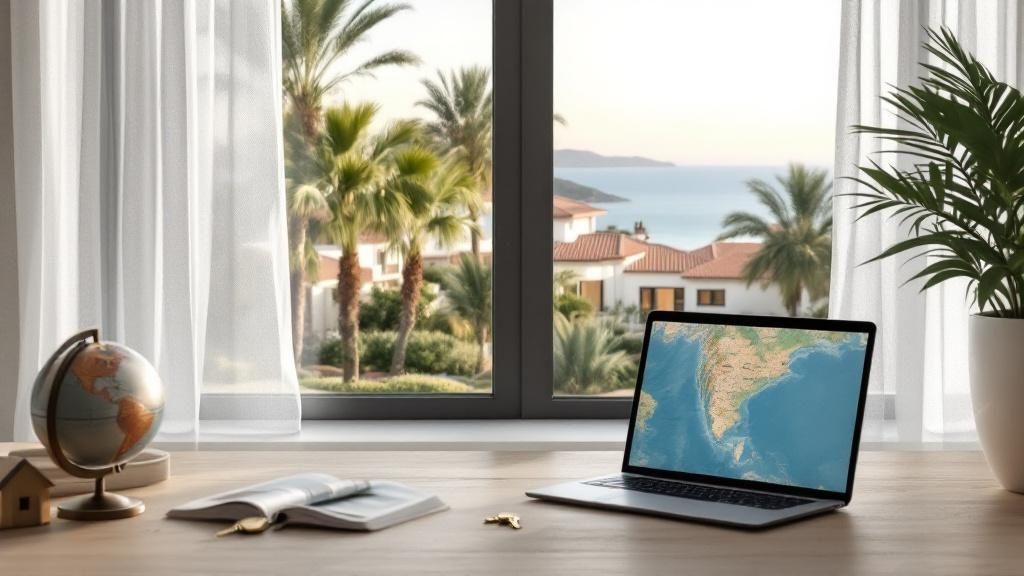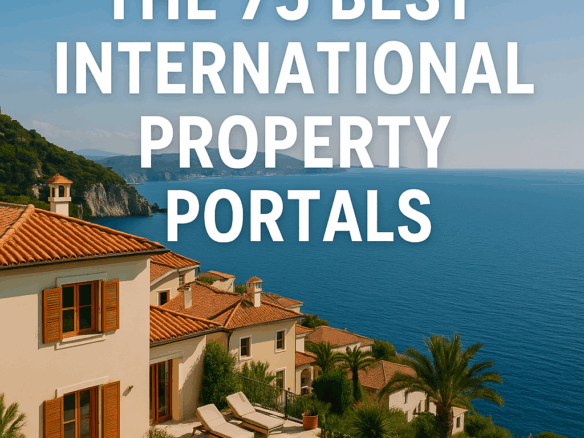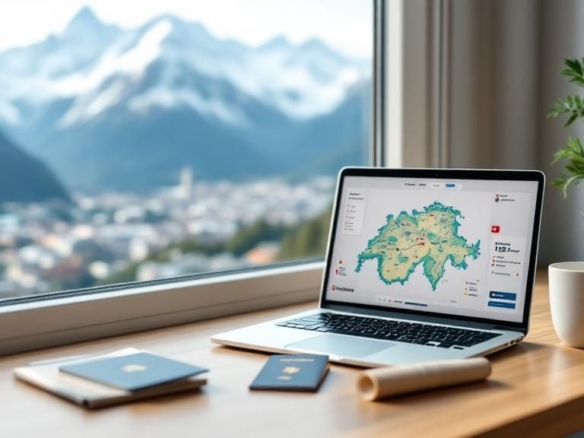Meta Description: Buying a house in another country is a significant undertaking, but it is an ambition entirely within reach with a clear, strategic plan. Getting the keys to your dream home abroad comes down to understanding the entire process—from the initial idea and financial planning all the way through navigating foreign legal systems and finally closing the deal. This guide is designed to be your essential roadmap for how to buy a house overseas.
Starting Your Overseas Property Journey
Everyone’s reason for buying property abroad is unique. For some, it’s the pull of a sun-drenched retirement villa in Portugal or a quiet mountain escape in an emerging South American hotspot like Colombia. For others, it’s a purely calculated investment—chasing high rental yields from a sleek city apartment in Dubai or betting on capital growth from a new coastal development in Mexico.
Whatever your “why,” the “how” follows a structured path. But the journey doesn’t start with scrolling through property listings. It starts with introspection to clarify your personal and financial goals. Are you looking for a lifestyle change, a source of passive income, or a solid asset in a different currency? Your answer will steer every decision, from which market to focus on to the type of property you buy.
“We’re seeing a shift where buyers are not just looking for a holiday home, but a genuine foothold in a new culture,” notes Nick Marr, founder of Homesgofast.com and EuropeanProperty.com. “This makes understanding the entire process, from a 30,000-foot view, more critical than ever before for those learning how to buy a house overseas.”
Your Global Property Roadmap
To figure out how to buy a house overseas successfully, you first need to get a handle on the key stages involved. Each step logically builds on the last, moving you from a simple idea to actual ownership. Think of it as assembling a complex puzzle; you need to see the picture on the box before fitting the pieces together.
The image below captures this idea—charting a course across the globe, pinning down potential locations, and carefully planning an international move.
This visual drives home the point that this is a journey of careful planning and discovery, not impulsive decisions. It highlights the importance of broad research before you zero in on a specific market.
Key Stages of Buying Property Overseas
Here’s a summary of the essential steps. This table provides a simple roadmap that breaks down the international property buying process.
| Stage | Key Objective | Primary Considerations |
|---|---|---|
| 1. Research & Strategy | Define goals and identify potential markets. | Investment vs. lifestyle, risk tolerance, residency goals, market stability, foreign ownership laws. |
| 2. Finance & Budgeting | Secure funding and create a comprehensive budget. | Mortgages, cash purchase, currency exchange (FX) risk, legal fees, taxes, ongoing maintenance costs. |
| 3. Legal Due Diligence | Assemble a legal team and verify the property. | Hire an independent solicitor, check title deeds, verify permits, understand local property laws. |
| 4. Search & Negotiation | Find a property and make an offer. | Work with a reputable agent, conduct viewings (virtual or in-person), negotiate terms, sign reservation agreement. |
| 5. Closing & Ownership | Finalise the transaction and take possession. | Sign final deeds with a notary, register the property, arrange utilities, and plan for property management. |
Think of this table as your strategic guide. In the sections that follow, we’ll dive deep into each stage, giving you the practical knowledge needed to navigate the complexities of buying real estate abroad.
Finding Your Ideal International Real Estate Market
Deciding where in the world to buy property is easily the most exciting part of learning how to buy a house overseas. It’s easy to get lost in daydreams of a chic Parisian apartment or a sun-drenched villa in Costa Rica. But a successful purchase is built on solid research, not just pictures from a travel magazine.
Your perfect market sits at the intersection of lifestyle goals, investment strategy, and cold, hard economic facts.
The first move is to look beyond personal taste and dig into global property trends. According to a recent Knight Frank report, global prime residential prices are expected to rise by 2.1% in 2024, with cities like Auckland, Mumbai, and Dubai leading the charge. Cross-border investment is especially robust, with significant capital flowing into EMEA and Asia-Pacific. Following this money trail can lead you to markets with real momentum and investor confidence.
Evaluating Market Fundamentals
To narrow down your options, you need to look at core fundamentals. This isn’t just about finding a beautiful spot; it’s about making a smart financial move that protects your capital.
Here’s what you should be scrutinising:
- Economic Stability: Look for countries with a stable government, steady GDP growth, and controlled inflation. These are signs of a resilient property market that can weather global fluctuations.
- Foreign Ownership Laws: This is critical. Can you, as a foreigner, own property outright (freehold)? Some countries have restrictions, forcing you into leaseholds, setting up a local corporation, or buying only in specific zones.
- Property Rights: A strong, transparent legal system that protects private property rights is non-negotiable. You want an established and predictable process for handling property deals.
- Taxation Policies: Get a clear picture of the entire tax situation. This includes purchase taxes (like stamp duty), annual property taxes, capital gains tax when you sell, and potential inheritance taxes. These costs can significantly impact your net return.
Balancing Capital Growth and Rental Yield
Your investment goals will dictate where you should look. Are you hunting for long-term price appreciation, or do you need steady rental income? It’s rare to find a market that delivers the absolute best of both. A crucial long-tail keyword for investors is finding the best country for real estate investment.
- For Capital Growth: Target emerging markets or cities undergoing major infrastructure upgrades. Places like Portugal’s Algarve, developing coastal towns in Mexico, or hotspots in Uruguay have a track record of strong appreciation.
- For Rental Yield: Focus on cities with a booming tourism industry, a large expat population, or a major university. Markets like Dubai or certain parts of Florida are known for delivering solid, consistent rental income.
This choice is fundamental. A high-growth area might give lower rental returns initially, while a high-yield market might not see values climb as quickly. For a closer look at specific countries, explore the country buying guides on Homesgofast.com.
A classic rookie mistake is confusing a great holiday spot with a great investment. The things that make a place fun for a two-week holiday—like tourist-trap restaurants—don’t always translate into a stable, year-round rental market or solid price growth.
Leveraging Credible Data Sources
Making a smart decision means relying on unbiased information. Don’t base your choice solely on a developer’s glossy brochure. You need hard data from sources like the OECD, the Financial Times, or government statistics offices. As you dive into specific markets, you’ll also find helpful resources written for foreign buyers, like a guide to investing in real estate in Turkey, which provides crucial local details.
By mixing broad economic analysis with on-the-ground market data, you can turn a vague dream into a well-defined property search. This ensures your journey of buying a house overseas starts on the right foot.
Getting Your Finances in Order for an International Purchase
Nailing down your finances is the most important part of buying a house overseas. A successful purchase isn’t just about finding the right villa; it’s about a rock-solid financial strategy that anticipates every cost, not just the number on the listing. This is where the daydream becomes a workable plan.
Your first move is to build a budget that goes beyond the asking price. The final cost can easily be 10-15% higher than the sale price once you add up all associated fees. You must factor these in from the beginning. A key question many US buyers ask is about the tax implications of buying property abroad for US citizens.
Building a Realistic Purchase Budget
To sidestep any nasty surprises, your budget needs to cover a range of costs you probably wouldn’t encounter back home. A proper financial plan should break down:
- Legal and Notary Fees: Expect to pay 1-2% of the property’s value. This covers your independent lawyer and the public official who makes the transaction official.
- Property Transfer Taxes: This is often the biggest “hidden” cost. It can be a modest 1% in some places or shoot past 10% in popular European markets.
- Agent Commissions: While the seller usually pays this, in some countries, the buyer is responsible for a portion of the estate agent’s fee.
- Currency Conversion Costs: The fee to exchange a large sum of money isn’t trivial.
- Ongoing Ownership Costs: Budget for annual property taxes, community fees (for pools or maintenance), property insurance, and the initial costs of setting up utilities.
“Many first-time overseas buyers focus solely on the asking price and mortgage rates,” says Nick Marr of Homesgofast.com. “Seasoned investors, however, know the real work is in mastering the ‘soft costs’—taxes, fees, and currency exchange. That’s what separates a smooth transaction from a costly lesson.”
Exploring Your Financing Options
Once you have a clear picture of the total cost, you can figure out how you’re going to pay for it. You have three main paths:
- A Local Mortgage in Your Target Country: Getting a mortgage as a non-resident is possible in many countries, but be prepared for a larger down payment. Lenders often want 30-50% deposits from foreign buyers. Our guide on minimum deposits for overseas mortgages dives into the specific requirements. The upside is you’re borrowing in the local currency.
- Using an International Mortgage Broker: These specialists have relationships with banks comfortable lending to foreign nationals, which can simplify the application and secure better terms.
- A Cash Purchase: Paying in cash is the simplest route. It makes you an attractive buyer and streamlines the closing process. The major catch? It leaves you completely exposed to currency risk.
Managing Foreign Exchange Risk
Currency fluctuations are one of the biggest financial minefields when you buy a house overseas. Imagine making an offer, and then between that day and the final payment, your home currency takes a nosedive. That could suddenly add thousands to your purchase price.
Instead of using your regular high-street bank, it’s smart to work with a specialist foreign exchange (FX) service. They offer tools like forward contracts, which let you lock in an exchange rate today for a transaction months from now. This removes market volatility from the equation and is a key part of a secure purchase.
Navigating the Legal Maze and Due Diligence
Once your finances are in order, the real technical work begins. Every country’s property laws are a unique mix of regulations and cultural norms. Learning how to buy a house overseas means getting to grips with this legal framework. Trying to go it alone isn’t just risky—it’s a massive strategic error.
The single most important hire you’ll make is an independent, multilingual solicitor. They need to specialise in local property law for foreign buyers and, crucially, work only for you. Their loyalty shouldn’t be to the seller, the agent, or the developer. This person is your first line of defence.
The Core of Legal Due Diligence
Your solicitor’s main job is to conduct exhaustive due diligence. This isn’t just a box-ticking exercise; it’s a deep dive into the property’s legal history and current standing.
This critical review covers:
- Verifying Title Deeds: This confirms the seller is the legitimate owner with the legal right to sell, as registered at the official Land Registry.
- Checking for Encumbrances: They’ll search for any outstanding debts, mortgages, or legal claims (liens) tied to the property.
- Confirming Planning Permissions: This check ensures the property was built legally and that any additions have the proper permits.
Understanding Different Legal Systems
Globally, property law generally falls into two camps: common law and civil law. Places like the UK and US use common law. In contrast, most of Europe and South America operate under civil law, which is based on codified statutes. This matters because in civil law countries, a notary public has a more significant, almost judicial role in finalising the sale.
Untangling the Web of Property Taxes
Beyond the purchase price, you need a clear strategy for managing ongoing tax obligations. A specialised tax advisor, working with your solicitor, is essential.
Initial taxes like stamp duty or transfer tax are just the start. You also have to plan for:
- Annual Property Taxes: Ongoing taxes collected by local governments.
- Capital Gains Tax: The tax you’ll owe on any profit when you eventually sell.
- Inheritance Tax: It’s vital to understand how the property will be handled for estate purposes, both in your home country and where the property is located.
In certain regions, it’s also worth looking into programmes like the Golden Visa options tied to property investment in Dubai. These can offer significant residency benefits that might influence your decision. Think of this legal and tax groundwork as a critical investment in securing your asset.
Building Your Team and Making an Offer
You cannot buy a property abroad on your own. The journey from spotting a potential home to legally owning it requires a trusted local team—your boots on the ground.
The heart of your team is a reputable local estate agent with proven experience helping international clients. They won’t just have the best listings; they’ll understand the subtle art of negotiation, which can be wildly different from one country to the next.
Selecting the Right Local Agent
Finding the right agent is about more than browsing properties. Think of them as your strategic advisor. Ask them:
- How do you typically handle communication with overseas clients? You want someone comfortable with virtual tours, video calls, and digital documents.
- Can you connect me with past international buyers you’ve worked with? Hearing from previous clients is worth its weight in gold.
- What’s your experience with the specific legal and financial hurdles for foreign buyers? A seasoned agent will know the common tripwires.
An agent who gets your unique needs will make everything feel smoother. They can also be your gateway to other trusted professionals. A great starting point is to find professionals who actively list properties for sale to foreign buyers on established international websites like Homesgofast.com.
Mastering the Property Viewing
Whether you’re walking through a property in person or via a high-definition video call, you need a system. It’s easy to get swept away by a gorgeous ocean view, but you have to look past the pretty parts.
“A common mistake I see is buyers getting emotionally attached to a property before doing the practical checks,” advises Nick Marr of Homesgofast.com. “You must balance the dream with diligence. Look for signs of damp, check the water pressure, and ask about the age of the electrical systems. These details matter immensely.”
During any viewing, be meticulous. Look for cracks in the walls or any hint of water damage. If it’s a virtual tour, make your agent show you everything—inside cupboards, utility connections, and what the neighbourhood looks and sounds like at different times of the day.
Making a Formal Offer
Found the one? Now it’s time to make an offer. This part is usually more formal than you might be used to and almost always has to be in writing. Your offer needs to be clear on:
- The Offer Price: The amount you’re willing to pay.
- Conditions (Contingencies): Anything that must happen for the sale to go through, like getting your financing approved or a satisfactory building inspection.
- Inclusions: A detailed list of what comes with the property—furniture, appliances, etc.
- Proposed Timeline: Key dates for signing contracts and final closing.
Once you’ve settled on a price, you’ll typically sign a preliminary contract (e.g., a reservation agreement) and put down a deposit, usually 5-10% of the purchase price. This takes the property off the market and kicks off the final legal checks.
Finalising the Purchase and Managing Your New Property
You’ve navigated the market, secured your financing, and completed the due diligence. Now, it’s time for the closing. But getting the keys is just the beginning of your journey as an international property owner.
The closing process itself usually happens at the office of a public notary, a neutral, state-appointed official common in civil law countries. Their job is to witness the signing of the final deed of sale—the Escritura in Spain or the Acte de Vente in France—and verify that every legal box has been ticked.
Once everything is signed, you’ll make the final payment transfer and get the keys. Your solicitor then registers the property in your name at the local Land Registry, which officially cements your ownership.
From Owner to Manager
With the property legally yours, your focus shifts to the practicalities. It’s about putting a plan in place to protect and manage your investment from thousands of miles away. First on the list should be securing comprehensive property insurance tailored for overseas homes.
For most investors, hiring a good property management company is a no-brainer. They become your eyes and ears on the ground, handling everything from routine maintenance and finding tenants to collecting rent. If you’re thinking of managing a rental yourself, it’s crucial to understand what you’re getting into. This guide on How to Run an Airbnb From a Distance is a fantastic starting point.
Maximising Your Investment’s Potential
For those buying as an investment, smart management drives your return. In some up-and-coming areas, you might see gross rental returns pushing 6-7% annually. In more mature markets, a yield closer to 3-4% is more realistic. Knowing these numbers helps you balance the potential for steady income against capital growth.
Ultimately, successful long-term ownership comes down to having solid systems. For more in-depth advice, check out our guide on how to manage your overseas property from a distance.
FAQs: Your Questions on Buying Property Abroad Answered
Jumping into an international property purchase is a huge step. Getting clear on common worries is a massive part of learning how to buy a house overseas. It’s what gives you the confidence to make it happen.
What are the biggest hidden costs I should know about?
The sticker price is just the beginning. The real budget-busters are often the closing costs. You’ll need to account for legal fees (1-2% of the purchase price), notary fees, and property registration charges. Then there are transfer taxes—these vary wildly by country, from a manageable 1% to a hefty 10% or more. Don’t forget recurring expenses: annual property taxes, community fees, insurance, wealth taxes, and currency conversion fees.
Can I actually get a mortgage in another country?
Yes, you often can, but be prepared for a challenge. Many countries have banks willing to lend to non-residents, but they’ll almost always ask for a larger deposit—think 30-50% of the property’s value. You’ll also face more intense paperwork. An international mortgage broker can be a lifesaver. We partner with experts at Homesgofast.com who specialise in finding lenders for foreign buyers, making the process smoother.
Do I really need a local bank account?
For the most part, yes. It’s pretty much a requirement for transferring the final purchase funds. More importantly, it’s essential for handling day-to-day costs once you own the place—utility bills, community fees, and local taxes. Opening an account is a standard part of the buying process, and your lawyer can usually walk you through the paperwork.
How can I be sure the property title is clean?
This is the most critical job for your independent lawyer. Their first order of business will be to perform a deep dive at the local Land Registry. They’ll verify the seller is the true owner, check for any outstanding debts or legal claims (liens) tied to the property, and make sure every permit is in order.
A golden rule for any international buyer: never, ever rely on the seller’s or developer’s lawyer. Hiring your own independent legal counsel is the single most important investment you’ll make. It’s what protects your asset and guarantees a secure, legitimate transaction.
About Homesgofast.com
HomesGoFast.com is a leading international property website, established in 2002, helping homeowners, real estate agents, and developers reach overseas buyers. Featuring thousands of listings from over 50 countries, the platform connects global property seekers with homes, apartments, villas, and investment opportunities worldwide.
Looking for expert mortgage guidance? Get international property mortgage advice here:
👉 https://homesgofast.com/mortgages-overseas/
Explore more overseas homes for sale at our global partner site:
👉 https://homesgofast.com/overseas-property/
Looking to sell real estate to foreign buyers? Go to
https://homesgofast.com/sell-overseas-property/




